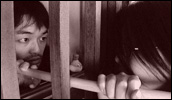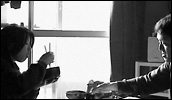The Soup One Morning
- Year
- 2004
- Original title
- Aru Asa Supu wa
- Japanese title
- ある朝スウプは
- Director
- Cast
- Running time
- 90 minutes
- Published
- 11 May 2005



by Tom Mes
Having celebrated its 30th anniversary in 2008, the PIA Film Festival is still a force to be reckoned with within Japanese cinema. Champion of amateur and independent filmmaking, its annual selection of short films and features from unknowns has served as the launching pad for some of today's biggest names, including Sogo Ishii, Kiyoshi Kurosawa, Shinya Tsukamoto and Ryosuke Hashiguchi, who have often gone on to make their first professional features with the aid of PIA's scholarship program.
That its recent crop of prize winners and scholarship recipients have tended toward the reassuringly enjoyable rather than the committedly confrontational as was the case with many past luminaries may be more a sign of times than an indication of PIA's changing policies. Against an increasingly stale and formulaic mainstream output, the annual PIA harvest still holds its own as a gathering of idiosyncratic talent.
Where the festival was once a haven for 8mm, today it is digital video that rules supreme as the format of choice for amateur cineastes. The pros and cons of DV have been weighed often enough, but the jury is still out on the full acceptance of the medium by audiences and critics alike. While the format is now a fixture of the festival scene and has pierced the general audience sphere - thanks largely to the efforts of a group of enterprising and publicity-savvy Danes - the feeling that something shot on DV doesn't constitute a real film is still commonplace, admittedly not always without reason.
Sometimes though, this attitude can hinder full recognition for a film of very obvious quality. Izumi Takahashi's The Soup One Morning, winner of the 2004 PIA Grand Prix, is a case in point. This is a story of the gradual collapse of a relationship under the strains of one partner's mental breakdown. It is solidly written, extremely well acted, and generally handled with great sensitivity and empathy. The use of DV and a single apartment interior as location render the proceedings suitably oppressive and claustrophobic. In short, The Soup One Morning easily rivals and perhaps even surpasses Makoto Shinozaki's Okaeri as both a portrayal of the quotidian effects of mental illness on a household and a very talented young filmmaker's feature debut. But where Shinozaki's film became one of the signature works of contemporary Japanese cinema, The Soup One Morning already met with comments from critics that "had it been shot on film I would have liked it a lot more."
True, the film was made for next to nothing, the actors were also the crew and sometimes had to hold their own microphones just out of shot during a take, but this is nothing we haven't seen, accepted or embraced before (Tsukamoto's Tetsuo, anyone?). Despite its thoroughly anti-aesthetic visual approach, the bottom line is this: The Soup One Morning is among the most sensitive, thoughtful, harrowing, and downright promising Japanese film debuts of the past few years, on a par with any of the breakthrough films by the arthouse favourites of the 'New New Wave' of the 1990s (Hashiguchi, Shinozaki, Kore-eda, Aoyama, Kawase, Suwa, et al). Thankfully this was also recognised by several other festivals; it won the Dragons & Tigers award in Vancouver and competed in the Tiger Awards of the influential Rotterdam Film Festival in Holland. Miss it at your detriment.